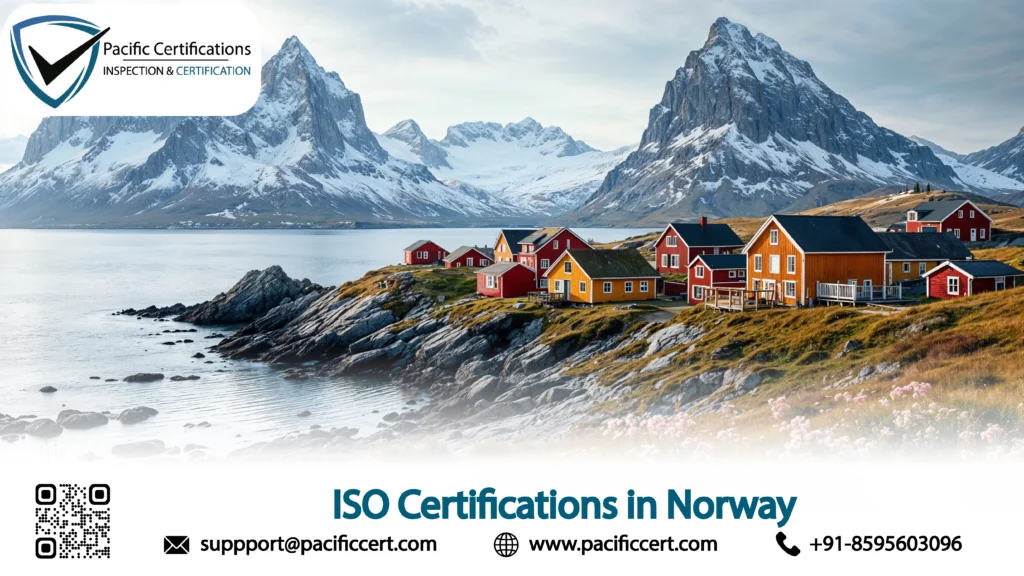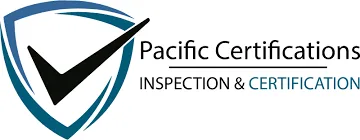
Introduction
Norway’s economy is anchored by offshore oil and gas, maritime and shipping corridors, seafood and aquaculture, advanced manufacturing, renewable energy projects, logistics and a strong digital and cloud-services layer. In this setting, ISO certification in Norway is no longer a nice to have; buyers expect clear proof that quality, safety, environment, information security and continuity are under control, not just described in policy documents.
For oil and gas operators, maritime and shipping companies, seafood processors and aquaculture businesses, engineering and manufacturing plants, logistics providers and cloud or IT platforms, ISO 9001 certification in Norway and integrated ISO 9001, ISO 14001 and ISO 45001 programs help protect margins, pass vendor checks and stay visible in global tenders. ISO 27001 certification in Norway is now a key signal for banks, fintech, cloud and data center operators, while ISO 22000 certification supports seafood exports and food chains. ISO certification benefits in Norway include faster prequalification, fewer disruptions and stronger trust with regulators, lenders and partners.
Share your scope and sites in Norway with Pacific Certifications and we will help you plan ISO certification in Norway that fits your reality. We map accreditation coverage, audit time and Stage 1 and Stage 2 audit windows for single-standard or integrated ISO 9001, ISO 14001, ISO 45001, ISO 22000 and ISO 27001 certification services, so you can pursue affordable ISO certification in Norway without overloading operations.
Economic context and industry overview
Norway combines a mature, high-income economy with strong public finances and long-term investment in energy, transport and digital infrastructure. Offshore oil and gas, pipelines and terminals anchor exports, while maritime and shipping routes link Norway to Europe, the Americas and Asia.
Seafood and aquaculture businesses operate along the coast with strict expectations on food safety, animal welfare and environmental impact. Manufacturing, engineering and equipment suppliers serve both domestic projects and global customers and a growing digital and IT sector supports banking, fintech, cloud services and public platforms. Across these sectors, buyers and regulators increasingly ask for traceable systems rather than informal controls, which drives demand for ISO certification standards in Norway.
Why ISO certifications matter in Norway?
Large customers, lenders and public bodies want evidence-based systems with clear records. ISO certification in Norway helps teams move faster through RFIs, RFQs and supplier-approval portals, keep plants, vessels and service lines steady and prove that they manage risks with discipline rather than informal practice.
Manufacturing firms, oil and gas contractors, maritime repair yards, logistics providers and service centers use ISO 9001 to strengthen process control, supplier oversight and change management.
Environmental and safety performance gain structure through ISO 14001 and ISO 45001, which guide control of emissions, waste and health and safety across offshore platforms, shipyards, warehouses, terminals and field-service operations. Banks, fintechs, cloud providers and data-center operators rely on ISO 27001 certification in Norway to handle information-security risks in a structured and auditable way. Seafood companies and broader food chains turn to ISO 22000 to run HACCP, traceability and hygiene controls that global buyers expect.
For many organizations, choosing the best ISO certification companies in Norway or working directly with an accredited certification body is now a standard step when planning long-term contracts and export growth.
Popular ISO standards in Norway
| Industry focus | Commonly requested standards | Why they matter |
| Oil and gas companies, offshore platforms and energy infrastructure | ISO 9001, ISO 14001, ISO 45001, ISO 50001, ISO 27001, ISO 22301 | Process control, site safety, environmental impact, energy use, information security, continuity |
| Maritime industry, shipping companies and ports | ISO 9001, ISO 14001, ISO 45001, ISO 28000, ISO 22301 | Turnaround discipline, yard safety, chain security, continuity for shipping routes |
| Seafood industry and aquaculture businesses | ISO 22000, ISO 9001, ISO 14001, ISO 45001 | HACCP, traceability, product quality, environment and worker safety at farms and processing plants |
| Manufacturing and engineering in Norway | ISO 9001, ISO 14001, ISO 45001, ISO 50001 | Consistent product quality, site EHS, energy use and maintenance discipline |
| IT, cloud, data centers, banking and fintech | ISO 27001, ISO 22301, ISO/IEC 20000-1, ISO 27701 | Information security, uptime, IT-service quality, privacy assurance |
Certification process in Norway
The ISO certification process in Norway should start from how work actually runs today, not from templates. The aim is to build a system that auditors can test without asking people to keep a separate “paper” version of the business. If you are asking how to get ISO certified in Norway, the steps below provide a practical roadmap:
- List products, services, sites, headcount and high-risk processes so the scope is clear and ISO certification audit time is realistic.
- Map processes end-to-end so handoffs, records and responsibilities are visible from suppliers through to customers, regulators and vessel or asset owners.
- Set policy and measurable objectives linked to customer needs, legal and permit conditions, safety and environment topics, information security, food safety and energy use.
- Build or refine controlled procedures, work instructions and forms so that ISO certification requirements in Norway are met by documents people can and will use.
- Run internal audits that sample high-risk operations, outsourced processes and IT platforms and keep clear records of findings, root-cause analysis and actions.
- Hold management review with KPIs, audit results, incidents and complaints, legal changes, resource decisions and improvement actions.
- Coordinate Stage 1 for readiness checks and Stage 2 for implementation verification, including how much can be done via remote interviews and document review versus on-site visits, especially for offshore or remote sites.
This structure works whether you need ISO certification for shipping companies in Norway, for seafood exporters, for aquaculture operations, or for manufacturing and IT services.
What are the requirements of ISO certifications in Norway?
ISO certification requirements in Norway mirror global ISO rules but must reflect local law, permits and buyer codes. Implementation should follow real work in plants and workshops, offshore installations, vessels and terminals, fish farms and processing sites, offices, data rooms and shared-service hubs so records hold up in audits, inspections and buyer reviews. Below are the key requirements:
- Clear scope covering products or services, processes and sites, including any multi-site programs or joint-venture assets.
- Controlled documents and records that match practice, with version-control, access rules and change-history that users actually follow.
- Risk assessment with operational controls for hazards such as process safety, marine operations, lifting activities, confined spaces, HACCP, cyber risks, privacy and energy use.
- Standard-specific artifacts such as HACCP plans and CCP logs (ISO 22000), risk assessment and Statement of Applicability (ISO 27001), hazard registers and permit to work records (ISO 45001), environmental aspect–impact registers and objectives (ISO 14001), energy review and indicators (ISO 50001).
- Legal and other requirements register with permits, inspections, calibrations, monitoring data and supplier compliance proofs across safety, environment, maritime rules, food, health, finance and data protection.
- Evidence of internal audits and management reviews completed on schedule with documented decisions and actions.
Tip: Align controls with Norwegian petroleum and maritime authorities, food-safety and veterinary rules, labor and HSE regulations, privacy and data-protection expectations and any clauses in customer or lender contracts.
What are the benefits of ISO certifications in Norway?
ISO certification benefits in Norway should be felt in daily work, not just in framed certificates. Used correctly, these systems can support growth, protect reputation and reduce waste and rework. Below are the key benefits:
- Faster prequalification in buyer portals and public procurement for energy, maritime, seafood, manufacturing, logistics and services.
- Fewer incidents, defects and stoppages on platforms, vessels, lines, sites and routes, which cuts rework, downtime and claims.
- Clearer roles and skill paths for operators, technicians, engineers, HSE staff, IT teams and managers across shifts and locations.
- Better traceability for investigations, recalls, warranty claims, cargo disputes, ESG summaries and lender or investor due-diligence.
- Stronger supplier and contractor control through audits, KPIs and corrective actions across transport, marine services, maintenance, cleaning, waste, utilities, IT and cloud providers.
- Measured gains in energy use, waste, emissions, uptime and yield at plants, terminals, warehouses, workshops and data centers.
- Stronger signals to global buyers that Norwegian seafood, maritime services, manufactured products and digital platforms run under audited systems.
Energy transition, stricter climate and environment targets and growing attention on safety and well-being at work keep pressure on oil and gas, maritime, manufacturing and logistics operators to maintain ISO 9001, ISO 14001 and ISO 45001 certification in Norway. Seafood industry players and aquaculture businesses face constant scrutiny on food safety, animal health and environmental impact, which pushes adoption of ISO 22000 and related hygiene programs.
Banks, fintechs, cloud providers and public platforms see rising expectations on information security and uptime, driving ISO 27001 certification in Norway, often combined with ISO 22301 and ISO/IEC 20000-1. As more organizations ask how to get ISO certified in Norway without excessive cost, interest grows in integrated systems and affordable ISO certification paths that still meet buyer and regulator expectations.
Challenges faced in Norway
Even with a strong technical base, organizations in Norway meet practical challenges when they start ISO work:
- Balancing time and budget for ISO implementation and certification while managing projects, shutdowns and seasonal peaks.
- Pockets of “paper-only” ISO where procedures exist but are not used, creating gaps between documents and reality.
- Shortage of trained internal auditors and process owners who can connect ISO clauses to real risks on platforms, vessels, plants or digital systems.
- Complex supply chains, joint ventures and outsourced processes that make it harder to keep controls consistent from tier 1 to tier 3 suppliers.
- Coordinating multi-site or offshore audits, especially where weather, vessel schedules or travel constraints affect on-site access.
What is the cost of certification in Norway?
ISO certification cost in Norway depends on headcount and risk, the number and spread of sites, chosen standards, the depth of sampling for offshore or remote facilities and the mix between on-site and remote audit activities. A single-site ISO 9001 project for a small office or workshop will require less audit time than a multi-site integrated ISO 9001, ISO 14001 and ISO 45001 certification for plants, terminals and offshore assets.
For many small to medium enterprises in Norway, cost is driven more by employee numbers, process complexity and the need for multi-site sampling than by revenue alone. Similar logic applies when adding ISO 22000 for seafood chains or ISO 27001 for banks, fintechs and IT services.
Your proposal from Pacific Certifications will itemize Stage 1, Stage 2 and surveillance days, explain on-site versus remote coverage and highlight any multi-site efficiencies so leadership and finance teams can plan clearly. For a tailored ISO certification cost in Norway and an affordable roadmap, contact support@pacificcert.com and request a free ISO certification cost estimate and audit timeline for your Norwegian operations.
What is the timeline for certification in Norway?
The ISO certification timeline in Norway depends on how ready your documentation and records are, how quickly you close Stage 1 findings, whether your program is single-standard or integrated and how many sites must be sampled. Planning around shutdowns, fishing seasons, offshore campaigns, maintenance windows and key customer audits also shapes the schedule.
A prepared single site such as one plant, depot, office, lab, or vessel operator can often move from application to decision within one audit cycle. Multi-site or integrated programs need more sampling and planning time, especially when offshore platforms, coastal facilities and head-offices all sit inside the same scope.
Important standards often requested by buyers in Norway
| Standard | Typical drivers in Norway |
| ISO 9001 | Supplier approval for oil and gas, maritime, seafood, manufacturing, logistics and services |
| ISO 14001 and ISO 45001 | EHS control for platforms, plants, depots, terminals, shipyards and field teams |
| ISO 22000 | HACCP and traceability for seafood, food processing, hospitality and retail |
| ISO 27001 and ISO 22301 | Information security and continuity for banks, fintech, telecom, cloud and public platforms |
| ISO 50001 | Energy-management for large industrial sites, terminals, campuses and data centers |
How Pacific Certifications can help?
Pacific Certifications provides ABIS-accredited ISO certification and audit services for oil and gas, maritime and shipping, seafood and aquaculture, manufacturing and engineering, logistics, healthcare, banking and fintech, IT and cloud services across Norway. We work as an independent ISO certification body, with transparent pricing and a team used to plant floor, offshore-site, vessel and data center realities as well as buyer and lender questions. Our certificates are accepted by procurement portals and international customers.
Request your ISO 9001, ISO 14001, ISO 45001, ISO 22000, ISO 27001 or integrated ISO audit plan and fee estimate. We will help you plan Stage 1 and Stage 2 timelines, sampling and evidence needs for your organization in Norway. Contact us at support@pacificcert.com to start your ISO certification journey in Norway.
Accredited training programs
Pacific Certifications provides accredited ISO certification training in Norway for ISO 9001, ISO 14001, ISO 45001, ISO 22000, ISO 27001, ISO 22301 and ISO/IEC 20000-1. These ISO training courses in Norway support both internal capability and audit readiness:
- Lead auditor training: for professionals who plan and perform ISO certification audits or internal audits in Norwegian organizations.
- Lead implementer training: for personnel who build or improve management systems in plants, terminals, vessels, warehouses, offices, banks, data center and digital platforms.
Courses can run online or on-site, depending on client needs, under ISO/IEC 17024 for personnel certification.
FAQs
How long does ISO certification take in Norway?
A well-prepared single site can usually complete initial certification within one audit cycle, while multi-site or integrated programs take longer.
What is the cost of ISO certification in Norway?
Cost depends on headcount, risk, number of sites, chosen standards and how much audit work is on-site versus remote.
Which Norwegian industries need ISO certification most?
Oil and gas, maritime and shipping, seafood and aquaculture, manufacturing, logistics, banking, fintech and IT services see the strongest demand.
How do we start the ISO certification process in Norway?
Define scope, map processes, address gaps against the chosen standard, run internal audits and then apply to an accredited ISO certification body.
Can ISO audits in Norway be partly remote?
Yes, document review and many interviews can be done remotely, with targeted on-site visits for high-risk operations and sites.
Which ISO standards are most common for seafood and aquaculture in Norway?
ISO 22000 for food safety, supported by ISO 9001 for quality and ISO 14001 and ISO 45001 for environment and safety.
Do small businesses in Norway benefit from ISO certification?
Yes, SMEs use ISO to win tenders, build buyer trust and stabilize daily operations even with lean teams.
Do we need an ISO certification consultant in Norway?
Some organizations use consultants, others build systems internally; the key is that the certification body remains independent and accredited.
Who conducts ISO certification audits in Norway?
ISO certification audits are carried out by accredited ISO certification bodies such as Pacific Certifications, using qualified auditors.
How do we maintain ISO certification once approved?
Keep running internal audits and management reviews on schedule, close nonconformities and complete yearly surveillance and three-year recertification audits.
Contact Us
If you need support with ISO Certifications in Norway, contact us at support@pacificcert.com.
Read More at: Blogs by Pacific Certifications






